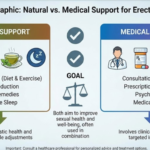Maintaining alertness and mental focus is essential in modern life, especially for individuals managing demanding work schedules, irregular sleep patterns, or cognitive fatigue. Modafinil 200 mg is a well-known medication that has been studied for its role in promoting wakefulness and supporting mental clarity when used responsibly under medical guidance.
Thank you for reading this post, don't forget to subscribe!Understanding how Modafinil works, who it may be suitable for, and how it should be used safely is important for making informed decisions.
What Is Modafinil 200 mg?
Modafinil 200 mg is a prescription medication primarily developed to promote wakefulness. It is commonly associated with the management of sleep-related conditions such as narcolepsy, shift work sleep disorder, and obstructive sleep apnoea–related daytime sleepiness.
Unlike traditional stimulants, Modafinil is considered a wakefulness-promoting agent rather than a direct central nervous system stimulant. This distinction contributes to its unique profile and lower tendency to cause jitteriness when used appropriately.
How Modafinil Works in the Brain
Modafinil influences several neurotransmitters involved in wakefulness and cognitive function, including dopamine, norepinephrine, and histamine pathways. By gently enhancing activity in these systems, it helps the brain remain alert without overstimulation.
Rather than forcing wakefulness, Modafinil supports the brain’s natural alertness mechanisms, which may explain why many users report sustained focus without sudden energy spikes or crashes.
Benefits of Modafinil for Alertness and Focus
When used under medical supervision, Modafinil 200 mg may offer several cognitive-related benefits:
Improved Wakefulness
Modafinil helps reduce excessive daytime sleepiness, making it easier to stay awake and attentive during normal working hours.
Enhanced Concentration
Many individuals report improved ability to concentrate on tasks, particularly those requiring sustained mental effort.
Reduced Mental Fatigue
By supporting consistent alertness, Modafinil may help reduce feelings of cognitive exhaustion linked to poor sleep or irregular schedules.
Stable Energy Levels
Compared to traditional stimulants, Modafinil is often associated with smoother mental alertness rather than sudden bursts of energy.
Who May Be Prescribed Modafinil 200 mg?
Modafinil is typically prescribed to individuals diagnosed with:
- Narcolepsy
- Shift work sleep disorder
- Obstructive sleep apnoea (as an adjunct to primary treatment)
In some cases, healthcare professionals may evaluate its suitability for other off-label uses based on individual medical needs, although such use should always be guided by a qualified provider.
How Modafinil 200 mg Is Typically Used
Modafinil is usually taken once daily, often in the morning, to support alertness throughout the day.
General guidance includes:
- Take as prescribed by a healthcare professional
- Avoid late-day dosing to reduce sleep disruption
- Maintain consistent sleep and lifestyle habits
- Do not exceed the recommended dose
Individual response may vary depending on health status, sleep patterns, and metabolism.
Safety Considerations and Precautions
While Modafinil is generally well tolerated when used correctly, it is not suitable for everyone.
Possible Side Effects
Some individuals may experience mild effects such as:
- Headache
- Nausea
- Dry mouth
- Dizziness
- Difficulty sleeping if taken too late
Serious side effects are uncommon but require immediate medical attention if they occur.
Important Precautions
- Not recommended for individuals with certain heart conditions without medical evaluation
- May interact with other medications, including hormonal contraceptives
- Not intended for use without professional guidance
- Should not replace healthy sleep habits
Understanding the safe use of cognitive-enhancing medication is essential to minimise risks.
Modafinil vs Traditional Stimulants
Traditional stimulants often increase energy by rapidly stimulating the central nervous system, which can lead to nervousness or energy crashes. Modafinil works differently by supporting wakefulness pathways more selectively.
This distinction is why Modafinil is sometimes associated with better tolerance and steadier mental performance when used under appropriate medical supervision.
Is Modafinil a Substitute for Sleep?
No. Modafinil is not a replacement for adequate rest. While it can support alertness, long-term sleep deprivation can still negatively impact health, mood, and cognitive function.
Healthy sleep routines remain essential for long-term mental wellbeing.
Final Thoughts
Modafinil 200 mg is a clinically recognised medication designed to support alertness and focus in individuals with specific sleep-related conditions. When used responsibly and under medical guidance, it may help improve wakefulness, concentration, and mental clarity without the overstimulation associated with traditional stimulants.
As with any medication affecting brain function, informed use, realistic expectations, and professional advice are key to ensuring safety and effectiveness.
Medical Disclaimer
This content is provided for educational purposes only and does not replace professional medical advice. Always consult a qualified healthcare provider before using Modafinil or any medication that affects alertness and cognitive function.








